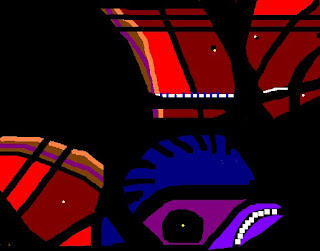The essence of reality is meaning. That which has no meaning is not real for us. Every fragment of reality lives due to the fact that it partakes of some sort of universal meaning. The old cosmogonies expressed this in the maxim 'in the beginning was the Word'. The unnamed does not exist for us. To name something means to include it in some universal meaning. The isolated, mosaic-type word is a later product, is the result of technique. The original word was an hallucination circling the light of meaning, was the great universal totality. The word in its colloquial, present-day meaning is now only a fragment, a rudiment of some former, all-encompassing, integral mythology. For that reason, it retains within it a tendency to grow again, to regenerate, to become complete in its full meaning. The life of the word resides in the fact that it tenses and strains to produce a thousand associations, like the quartered body of the snake of legend, whose separate pieces sought each other in the dark. The thousandfold yet integral organism of the word was torn into individual phrases, into letters, into colloquial speech and in this new form, applied to practical needs, it has come down to us as an organ of understanding. The life of the word and its development have been set on new tracks, on the tracks of practical life, and subjected to new notions of correctness. But when in some way the injunctions of practice relax their strictures, when the word, released from such coercion, is left to its own devices and restored to its own laws, then a regression takes place within it, a backflow, and the word then returns to its former connections and becomes again complete in meaning - and this tendency of the word to return to its nursery, its yearning to revert to its origins, to its verbal homeland, we term poetry.
Poetry is the short-circuiting of meaning between words, the impetuous regeneration of primordial myth.
When we employ commonplace words, we forget that they are fragments of ancient and eternal stories, that, like barbarians, we are building our homes out of fragments of sculptures and the statues of the gods. Our most sober concepts and definitions are distant offshoots of myths and ancient stories. There is not even one of our ideas that is not derived from mythology, a mythology that has been transformed, mutilated, remoulded. The spirit's first and foremost function is to tell stories and to make up 'tales'. The driving force of human knowledge is the conviction that at the end of its investigations, it will discover the ultimate meaning of the world. It seeks this meaning on the heights and scaffolding of its artificial mounds. But the elements which it uses in construction have been used once before, have come from forgotten and shattered 'stories'. Poetry re-cognizes the lost meanings, restores words to their proper place, and links them according to their ancient denotations. In the hands of the poet, the word, as it were, comes to its senses about its essential meaning, it flourishes and develops spontaneously in keeping with its own laws, and regains its integrity. For that reason, every kind of poetry is an act of mythologization and tends to create myths about the world. The mythologization of the world has not yet ended. The process has merely been restrained by the development of knowledge, has been pushed into a side channel, where it lives without understanding its true meaning. But knowledge, too, is nothing more than the construction of myths about the world, since myth resides in its very foundations and we cannot escape beyond myth. Poetry arrives at the meaning of the world anticipando, deductively, on the basis of great and daring short-cuts and approximations. Knowledge tends to the same inductively, methodically, taking the entire material of experience into account. At bottom, both one and the other have the same aim.
The human spirit is tireless in its glossing of life with the aid of myths, in its 'making sense' of reality. The word itself, left to its own devices, gravitates towards meaning. Meaning is the element which bears humanity into the process of reality. It is an absolute given. It cannot be derived from other givens. Why something should appear meaningful to us is impossible to define. The process of making sense of the world is closely connected with the word. Speech is the metaphysical organ of man. And yet over time the word grows rigid, becomes immobilized, ceases to be the conductor of new meanings. The poet restores conductivity to words through new short-circuits, which arise out of their fusions. The image is also an offshoot of the original word, the word which was not yet a sign, but a myth, a story, or a meaning.
At present we consider the word to be merely a shadow of reality, its reflection. But the reverse would be more accurate: reality is but a shadow of the word. Philosophy is really philology, the creative exploration of the word.
Translated by John M. Bates
Source: Bruno Schulz, "Mityzacja rzeczywistosci", Republika marzen. Warszawa: Chimera, 1993: 49-50.
©Dr John Bates, 1999


